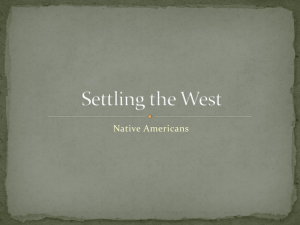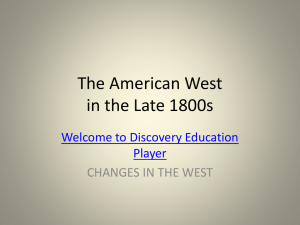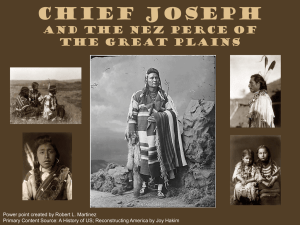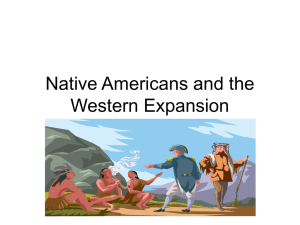CEDI Presentation - Ke-ondaatiziying Conference
advertisement
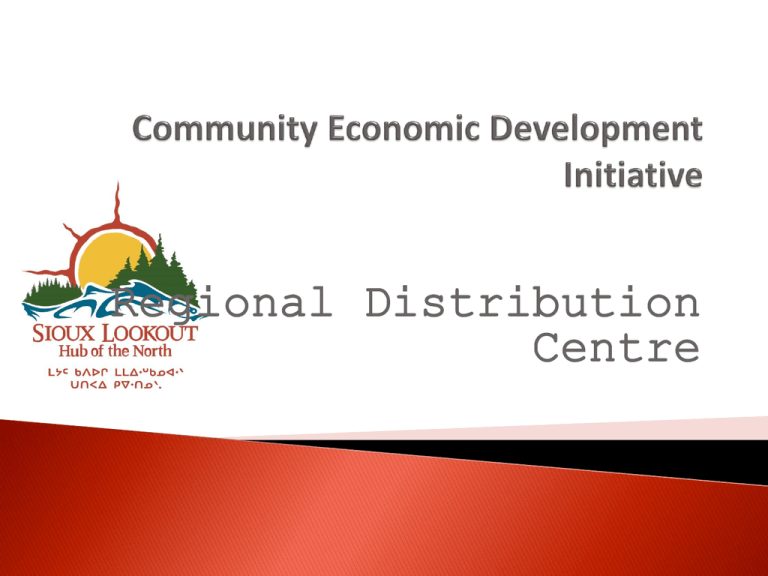
Regional Distribution Centre Six First Nation- Municipal pairs across Canada Two-year pilot project Northwestern Ontario First Nation-Municipal Partners Lac Seul First Nation, Kitchenuhmaykoosib Inninuwug (KI) And, Sioux Lookout Joint initiative with Federation of Canadian Municipalities (FCM) and the Council for the Advancement of Native Development Officers (Cando) Partners are to work collaboratively on a regional development project CEDI Partners LAC SEUL FIRST NATIONS CEDI partners are exploring the feasibility of a Regional Distribution Centre (RDC) that would serve as a central distribution point for fresh foods and consumer goods The objective is to sources direct from manufacturers or importers to allow for: competitive pricing, better ‘use by’ dates, shorter delivery times, and reduced stock holding. The RDC would provide the space and equipment for food and consumer goods to be stored, lightly processed, packed, and palletized as well wholesale and retail vending space, and offer storage space for communities with limited capacity The RDC would operate as a non-profit social enterprise Lac Seul and Sioux Lookout are located 430 and 400 road km respectively northwest of Thunder Bay KI (Big Trout Lake) is a remote FN community located 430 air km north of Sioux Lookout (limited access in winter by road) Why Sioux Lookout RDCs are strategically placed close to point of use, taking advantage of local transport hubs to serve several communities from one point Sioux Lookout services 30,000 people from 29 remote First Nation communities Sioux Lookout Lac Seul Thunder Bay Sioux Lookout Airport - CYXL 30,000 movements annually 120,000 passengers annually First Nations-Municipal Community Economic Development Initiative (CEDI) a joint initiative of FCM & CANDO KI, Lac Seul First Nations, Municipality of Sioux Lookout DEVELOPMENT SOURCING ECONOMIC LOGISTICS CONSUMER GOODS & FOODS EDUCATION TRAINING EMPLOYMENT REGIONAL DISTRIBUTION CENTRE SOCIAL ENTERPRISE In many ways, developing a co-operative business is a lot like developing a traditional business. Where things differ is that a co-op is shaped through collective effort and group decision-making as well as a set of co-operative principles that help to guide the business. This makes the business planning more complex, but it also means the resulting corporation is stronger and more likely to succeed. Why start a co-op?. You (and your organizing group) want to respond to a need/challenge/opportunity in your community in a democratic and sustainable way; www.ontario.coop http://cloverbeltlocalfoodcoop.com http://www.foodbanksnorthwest.ca/ Sioux Lookout and Big Trout are important transportation hubs Kitchenuhmaykoosib Inninuwug Sustainable Employment Training Programs for Youth at Risk Increase warehousing capacity Avoid Expiration Increase Security Lower Costs Healthy Choices Quality Assurance Consolidated Deliveries Help In Emergencies KI (Big Trout Lake) Lac Seul First Nation Municipality of Sioux Lookout Federation Canadian Municipalities Council for the Advancement of Native Development Officers Lakehead University – Food Security Research Network “Mapping Local Foods Systems in Northwestern Ontario” Sioux Lookout Meno Ya Win Health Centre “Greenhouse Project” Thunder Bay Economic Development Commission “Logistics Project” Cloverbelt Local Food Co-op On Co-op – The Ontario Co-operative Association Advisors: FedNor and NOHFC For more information, contact: Bruce Sakakeep, KI Director Economic Development bsakakeep@gmail.com Chris Angeconeb, Lac Seul Economic Development, General Manager cangeconeb@lsfn.ca Vicki Blanchard, Sioux Lookout Economic Development Manager vblanchard@siouxlookout.ca Q&A




